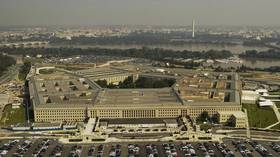Bipartisan bill aims to tackle rampant child porn sharing on Pentagon computers

Congress is weighing up a bipartisan bill to crack down on the sharing of child porn on Defense Department computers after a watchdog group found the Pentagon’s network ranked among the top US ISPs for sharing the vile content.
“The notion that the Department of Defense’s network and Pentagon-issued computers may be used to view, create, or circulate such horrifying images is a shameful disgrace, and one we must fight head on,” Abigail Spanberger (D-Virginia) said in a statement on Tuesday as she and co-sponsor Mark Meadows (R-N. Carolina) introduced the End National Defense Network Abuse (END Network Abuse) Act in the House.
Also on rt.com NXIVM sex cult leader Keith Raniere faces child pornography charges in new indictmentThe Defense Criminal Investigative Services (DCIS) will receive training in how to root out and successfully prosecute those using Defense Department equipment to access and trade child porn under the new legislation. The bill also integrates DCIS into a “multi-jurisdictional task force” with “federal, state, and local law enforcement,” social services, and child protection groups to help victims of child sexual exploitation – and to roll back the tide of filth engulfing Defense Department networks.
Congress has known for at least a decade that child porn trading on Defense Department computers was a problem. Immigration and Customs Enforcement identified 5,200 people “subscribed to websites that were known to contain child pornography” during 2008’s Project Flicker investigation, including hundreds of individuals “affiliated with” the Defense Department, some of whom even used their government email addresses and military post boxes to register on the offending websites. Worryingly, dozens possessed some form of security clearance.
While a handful of the offenders caught in Project Flicker received jail sentences, thousands more – up to 80 percent of those identified in the ICE report – did not, as “combating child pornography was not one of DCIS’ investigative priorities,” Spanberger and Meadows lament. This investigative blind spot leaves the Pentagon vulnerable to “blackmail, bribery, and other threats,” should employees with high security clearances become compromised through their weakness for child porn or other illicit activities conducted over Defense Department computers.
The Defense Department’s network ranked 19th out of 2,891 internet service providers for peer-to-peer trading of child porn in 2018, according to the National Criminal Justice Training Center, suggesting the problem has only gotten worse in the 10 years since Project Flicker wrapped up.
Also on rt.com Sandy Hook victims claim Alex Jones emails contain child porn, he says it was plantedA Senate version of the END Network Abuse Act was introduced in May by Lisa Murkowski (R-Alaska) and Brian Schatz (D-Hawaii). While neither chamber of Congress has set aside dates to discuss the measure, sponsors plan to pass it “both as individual bills and as amendments” to other bills, according to the Hill. Representatives TJ Cox (D-California) and Anna Eshoo (D-California) have also signed on to the House bill as co-sponsors.
Think your friends would be interested? Share this story!












